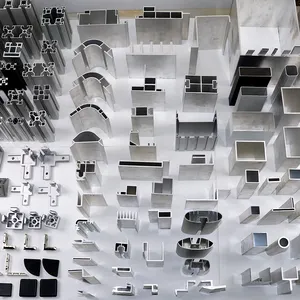(129168 products available)





















































































































































































































































Aluminium door profiles are integral components in various construction and design applications. These profiles form the framework of aluminium doors, combining durability with aesthetics. They are widely utilized in commercial and residential settings, offering versatility in design and functionality.
The array of shapes available in aluminium door profiles caters to diverse structural and design needs. From L-angled profiles for sturdy frame construction to hollow tubes and solid round tubes for sleek design elements, the selection is extensive. Other forms include T-shaped bars, J caps, and Z clips, each serving specific functional purposes in door assembly and installation.
Aluminium door profiles are not limited to door construction; they extend to office furniture, interior designs, and lighting fixtures. Their features, such as compatibility with sliding track systems and framing systems, enhance their applicability in various domains, including automotive parts and plumbing. The adaptability of these profiles is evident in their use across different engineering applications.
Typically crafted from 6,000 series grade aluminium alloys, these profiles offer a range of temper from T3 to T8, accommodating different levels of strength and flexibility. Surface treatments such as powder coating, PVDF coating, and anodizing not only provide a spectrum of color options but also enhance the profiles' resistance to corrosion. Techniques like sandblasting and electrophoresis contribute to the profiles' durability and aesthetic appeal.
The advantages of using aluminium door profiles are manifold. Their resistance to corrosion, coupled with the potential for various surface treatments, makes them a practical choice for long-lasting installations. The option for customization in terms of dimensions and finishes allows for tailored solutions to meet specific design requirements. Moreover, the availability of profiles with a wood grain finish provides an organic look suitable for household fixtures and building construction without compromising on the material's inherent strengths.
Selecting the appropriate aluminium door profile involves considering the application, desired aesthetics, and required durability. With a multitude of options available, it is essential to assess the profile's compatibility with other components like wheels, gaskets, and door locks. The final choice should align with the functional requirements and the overall design vision of the project.